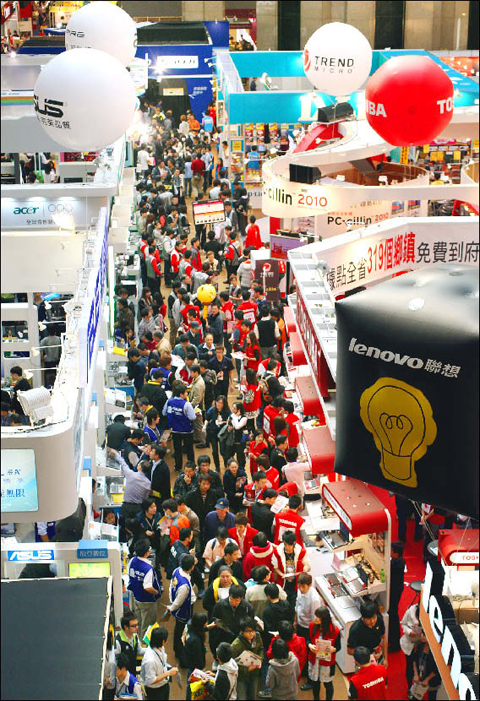Electronics manufacturers such as local PC maker Asustek Computer Inc (華碩電腦) saw unit sales grow as much as 30 percent during the annual information technology (IT) fair in Taipei, sending an encouraging message that consumers are beginning to spend on technology devices again, event organizer Taipei Computer Association (TCA, 電腦公會) said yesterday.
That may bring the total sales of electronic gadgets to NT$7 billion (US$218 million) during the nine-day year-end trade show, dubbed “IT Month,” up 16 percent from NT$6 billion last year, TCA said.
Most electronics makers, including Asustek, Sony and BenQ Corp (明基), said unit sales beat their expectations by between 15 percent and 40 percent, with notebook computers showing the strongest demand, the organizer said.

PHOTO: CNA
“Sales have exceeded our target of increasing 30 percent over last year,” Kevin Lin (林福能), a vice president of Asustek, said by telephone.
“We are seeing computer replacement demand, helped by widespread economic recovery,” Lin said.
People are preparing to upgrade their computers after Microsoft launched its new operating system, Windows 7, Lin said.
The nation’s economy is expected to shrink 2.53 percent annually this year, an upward revision from a decline of 4.04 percent made by the government statistics agency.
About 810,000 visitors scrambled to the trade show this year, up 6.6 percent from last year’s 760,000, as limited exhibition space hampered growth, the TCA said in a statement.
That indicated that consumer confidence was recovering gradually, the organizer said.
Ultra-slim standard laptop computers and all-in-one computers were a hit this year, replacing netbooks, the TCA said.
Handheld device makers also reported robust sales, helped by new products.
HTC Corp (宏達電), the world’s biggest maker of handsets running Microsoft’s system, and Garmin, the world’s second-biggest global positioning device maker, said their sales soared by 80 percent and 30 percent, from a year ago.
The fair is set to start its second of three sessions in Taichung on Friday, lasting until Dec. 16.
The last session of the fair will take pace in Kaohsiung from Dec. 26 to Jan. 1.

WEAKER ACTIVITY: The sharpest deterioration was seen in the electronics and optical components sector, with the production index falling 13.2 points to 44.5 Taiwan’s manufacturing sector last month contracted for a second consecutive month, with the purchasing managers’ index (PMI) slipping to 48, reflecting ongoing caution over trade uncertainties, the Chung-Hua Institution for Economic Research (CIER, 中華經濟研究院) said yesterday. The decline reflects growing caution among companies amid uncertainty surrounding US tariffs, semiconductor duties and automotive import levies, and it is also likely linked to fading front-loading activity, CIER president Lien Hsien-ming (連賢明) said. “Some clients have started shifting orders to Southeast Asian countries where tariff regimes are already clear,” Lien told a news conference. Firms across the supply chain are also lowering stock levels to mitigate

NEW PRODUCTS: MediaTek plans to roll out new products this quarter, including a flagship mobile phone chip and a GB10 chip that it is codeveloping with Nvidia Corp MediaTek Inc (聯發科) yesterday projected that revenue this quarter would dip by 7 to 13 percent to between NT$130.1 billion and NT$140 billion (US$4.38 billion and US$4.71 billion), compared with NT$150.37 billion last quarter, which it attributed to subdued front-loading demand and unfavorable foreign exchange rates. The Hsinchu-based chip designer said that the forecast factored in the negative effects of an estimated 6 percent appreciation of the New Taiwan dollar against the greenback. “As some demand has been pulled into the first half of the year and resulted in a different quarterly pattern, we expect the third quarter revenue to decline sequentially,”

Six Taiwanese companies, including contract chipmaker Taiwan Semiconductor Manufacturing Co. (TSMC), made the 2025 Fortune Global 500 list of the world’s largest firms by revenue. In a report published by New York-based Fortune magazine on Tuesday, Hon Hai Precision Industry Co. (better known as Foxconn) ranked highest among Taiwanese firms, placing 28th with revenue of US$213.69 billion. Up 60 spots from last year, TSMC rose 60 places to reach No. 126 with US$90.16 billion in revenue, followed by Quanta Computer Inc. at 348th, Pegatron Corp. at 461st, CPC Corp., Taiwan at 494th and Wistron Corp. at 496th. According to Fortune, the world’s

DIVERSIFYING: Taiwanese investors are reassessing their preference for US dollar assets and moving toward Europe amid a global shift away from the greenback Taiwanese investors are reassessing their long-held preference for US-dollar assets, shifting their bets to Europe in the latest move by global investors away from the greenback. Taiwanese funds holding European assets have seen an influx of investments recently, pushing their combined value to NT$13.7 billion (US$461 million) as of the end of last month, the highest since 2019, according to data compiled by Bloomberg. Over the first half of this year, Taiwanese investors have also poured NT$14.1 billion into Europe-focused funds based overseas, bringing total assets up to NT$134.8 billion, according to data from the Securities Investment Trust and Consulting Association (SITCA),